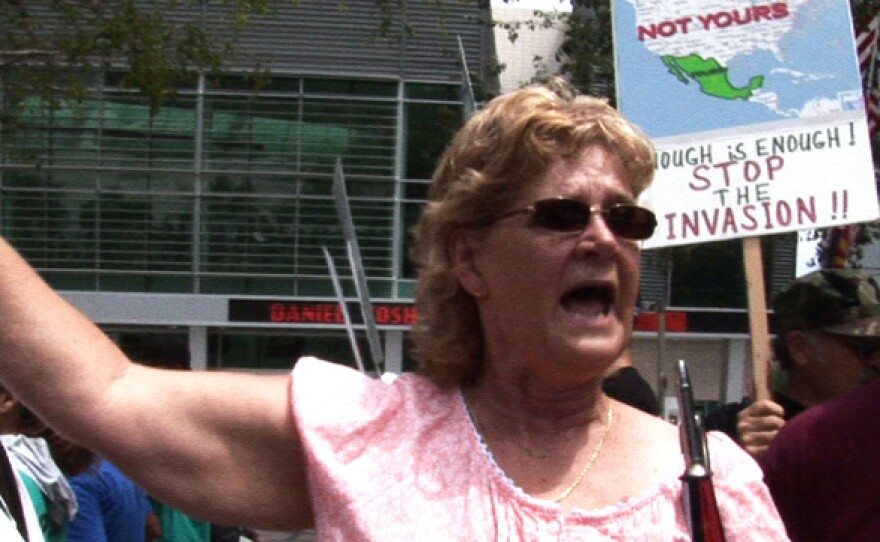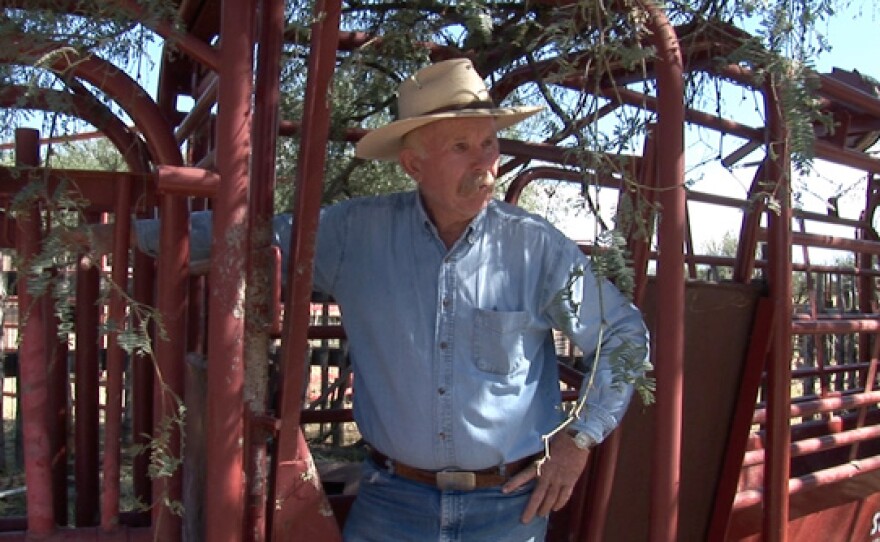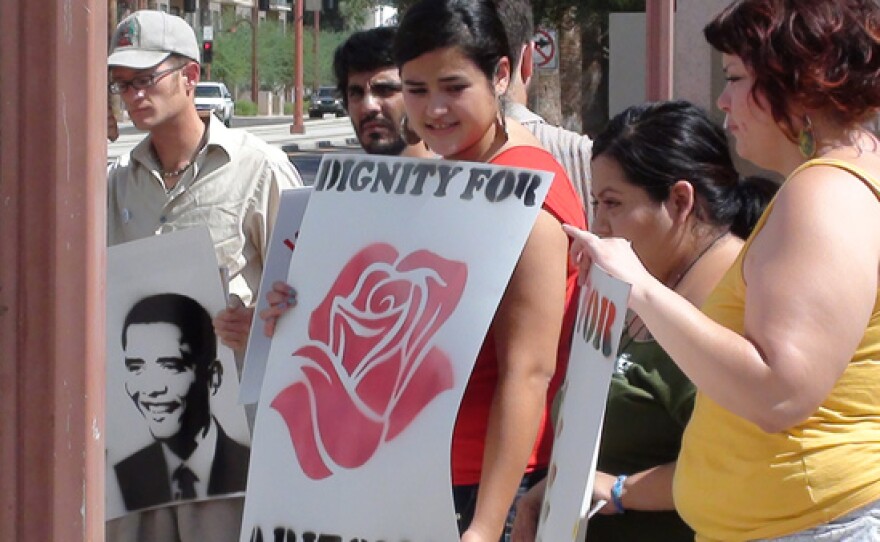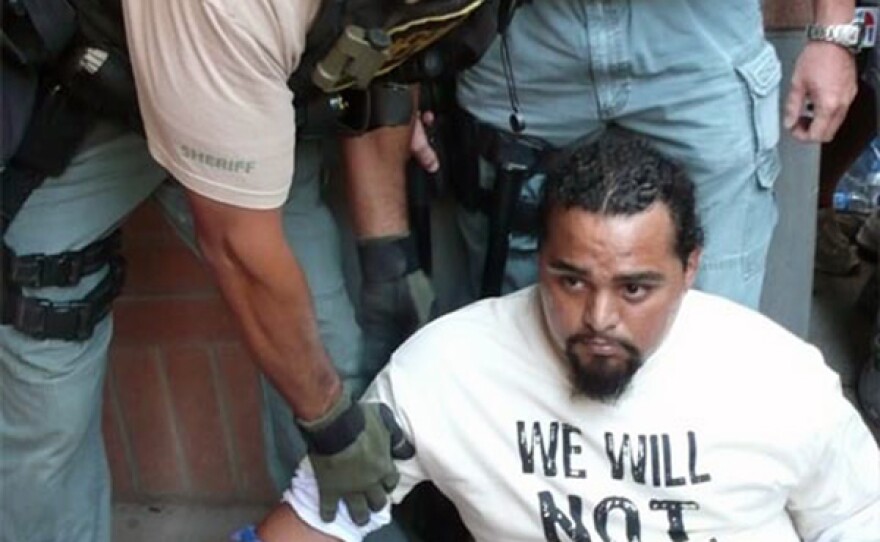"The State Of Arizona" captures the explosive emotions and complex realities behind Arizona’s headline-grabbing struggle with illegal immigration. Following Arizona’s controversial Senate Bill 1070, dubbed the “show me your papers” law, the film tells the stories of Arizonans on all sides of this divisive issue from ground zero of the nation’s immigration debate. Produced and directed by Carlos Sandoval and Catherine Tambini ("Farmingville"), "The State Of Arizona" premieres on the PBS series INDEPENDENT LENS, hosted by Stanley Tucci, on Monday, January 27, 2014 on PBS.




Between 1996 and 2009, illegal immigration rose 300 percent in Arizona, to an estimated 460,000 people. Frustrated with federal inaction and rising border tensions, Arizona lawmakers ignited a national maelstrom by instituting the SB 1070 law that requires police officers to ask for papers from people they reasonably suspect to be undocumented in the course of an otherwise lawful stop.
Designed to encourage self-deportation, the law’s stated purpose is to “deter the unlawful entry and presence of illegal aliens and economic activity by illegal aliens in the United States.”
Supporters call it a common sense law enforcement tool; opponents see it as a dangerous infringement of civil rights that would inevitably lead to harassment and racial profiling. The film follows the journey of the law all the way to the Supreme Court through the voices of those who wrote and support it and of the many who dread its power.
SB 1070 is meant to enforce immigration laws, “one traffic stop at a time,” according to its author, State Senator Russell Pearce. He’s on a zealous mission to preserve America from lawless intruders and the violence of the drug cartels. But as Pearce’s SB 1070 is on the brink of becoming law and a model for the nation, it galvanizes resistance. The movement is spearheaded by the immigrant rights organization Puente, led by Carlos Garcia. For Garcia, once undocumented himself, the struggle is painfully personal as members of his family are being deported.
The Puente movement is faced with the challenge of influencing elected officials on behalf of a population that can’t vote. With a coalition of state and national organizations, they organize a campaign to fight back on the streets, in the courts, at the ballot box, and with boycotts. Soon civil rights groups and the U.S. Department of Justice sue to block SB 1070 from becoming law.
Despite the protests, on July 29, 2010, SB 1070 becomes law. It’s been modified thanks to a federal court’s partial blockage announced the day before, but Russell Pearce’s political star is on the ascent. Mitt Romney cites SB 1070 as a model during his presidential campaign.
With momentum building, a new wave of even stricter laws is introduced in the Arizona legislature, including the first ever challenge to the 14th Amendment’s guarantee of U.S. citizenship through birth on American soil.
As the new bills are about to be voted on, Republican senators unexpectedly vote against the measures, convinced by CEOs from across the state that Arizona’s economy is suffering from the boycott and negative publicity. Several months later, Pearce is recalled, a first in Arizona history. “He misunderstood the support for 1070,” reflects Mesa Mayor Scott Smith. “People didn’t sign up for a challenge to the 14th Amendment.” A line is drawn on intolerance in the Arizona sand.
Almost two years later, in June 2012, the Supreme Court announces its opinion in the case of The United States v. Arizona, ruling that immigration law largely belongs to the federal government, not the states. But it allows the “show me your papers” portion to stand, so long as it can be implemented without racial profiling or unduly long detention.
Like everything else in Arizona’s conflict over immigration, no victory or defeat is simple because families, lives, and civic values lie in the balance in either direction. However, one thing is certain — SB1070 galvanized Latino voters across the country who turned out in record numbers to re-elect President Obama largely based on his campaign promise of immigration reform. Their show of strength changed the political landscape and pushed immigration reform to the forefront of the national agenda.
Past episodes of INDEPENDENT LENS are available for online viewing. INDEPENDENT LENS is on Facebook, and you can follow @IndependentLens on Twitter.
Coming to Independent Lens: The State of Arizona
"This topical documentary captures the explosive emotions and complex realities behind Arizona’s headline-grabbing struggle with illegal immigration. Tracking the year after Arizona passes SB1070





